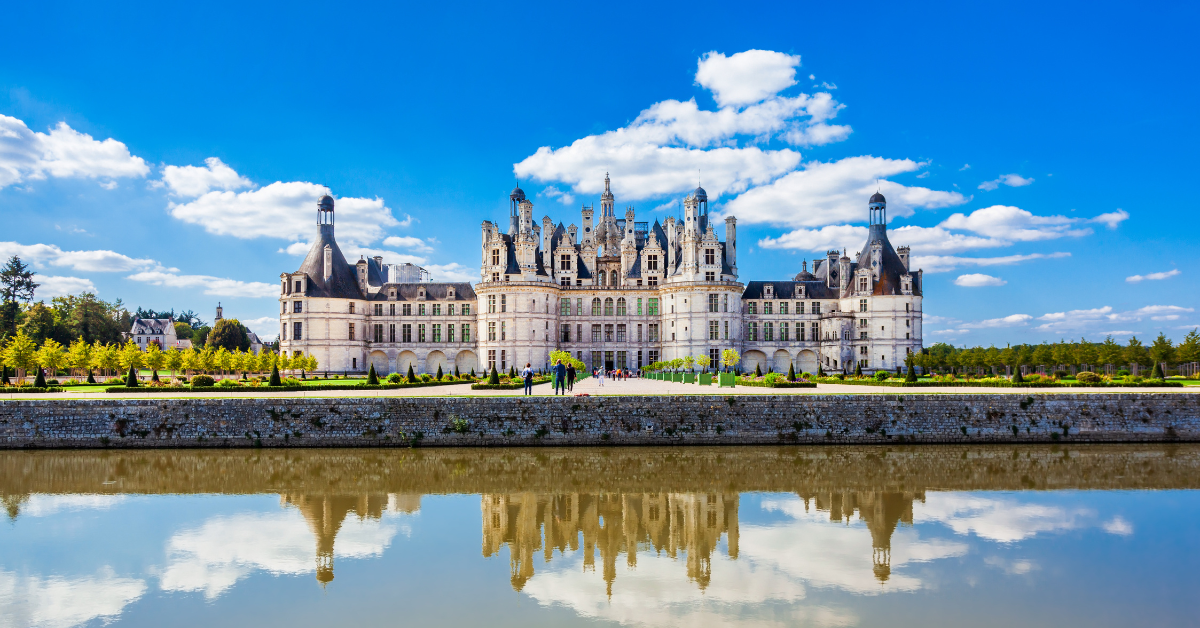Nestled in France’s Loire Valley, Chambord Castle is believed to be one of the real-life inspirations for Mariejois, the Celestial Dragons’ Holy Land in One Piece.
Its majestic exterior, ornate rooftops, and labyrinth of towers evoke the grandeur and mystery of the anime’s sacred city.
By exploring Chambord’s history, artistry, and its connection to the series, we uncover the real-world foundation of One Piece’s divine architecture.
Chambord Castle
Overview of Chambord Castle
Located in France’s Loire-et-Cher region, Chambord Castle is a UNESCO World Heritage Site and one of the most iconic examples of Renaissance architecture. It was commissioned by King Francis I in 1519 and incorporates Italian Renaissance elements. At its center lies the famous double-helix staircase, believed to have been influenced by Leonardo da Vinci. The castle’s over 600 towers and intricate roofline create a unique silhouette from every angle.
| Item | Details |
|---|---|
| Location | Loire-et-Cher, France |
| Construction Began | 1519 |
| Architectural Style | French Renaissance |
| UNESCO World Heritage | 1981 |
| Notable Features | Double-helix staircase, ornate towers, over 600 chimneys |
Built as a symbol of royal power and artistic ambition, Chambord Castle was designed not just as a hunting lodge but as a manifestation of grandeur and prestige.
Mariejois in One Piece
Setting of the Celestial Dragons’ Holy Land
In One Piece, Mariejois serves as the seat of the World Government and the sacred home of the Celestial Dragons. Situated atop the Red Line, it is depicted as a pristine white city filled with ornate palaces and symmetrical architecture, bearing a striking resemblance to Chambord Castle. Its elegance and isolation both emphasize its divine and political significance.
| Comparison | Chambord Castle | Mariejois |
|---|---|---|
| Location | Loire Region, France | Top of the Red Line |
| Style | Renaissance Architecture | Temple-like, Aristocratic |
| Symbolism | Royal Authority | Divine Power and Control |
| Design | Towers and symmetry | White spires and sacred halls |
The serene grandeur and otherworldly atmosphere of Mariejois mirror the geometric perfection and isolation of Chambord Castle.
Why Chambord Castle Is Considered a Model for Mariejois
Architectural Similarities
The design of Mariejois shares several features with Chambord Castle — especially its high central towers and elaborate roof structures. Both display a perfect balance of symmetry and complexity, exuding beauty from every perspective.
Shared Symbolism of Power
Chambord Castle was built to project King Francis I’s dominance and prestige, while Mariejois symbolizes the absolute rule of the Celestial Dragons. In both worlds, architecture serves as a visual embodiment of power and hierarchy.
| Common Aspect | Chambord Castle | Mariejois |
|---|---|---|
| Purpose | Representation of royal authority | Representation of divine supremacy |
| Layout | Central staircase, tall towers | Grand palace complex |
| Theme | Harmony and splendor | Divinity and authority |
The Beauty and Highlights of Chambord Castle
Enchanting Exterior and Gardens
The castle’s hundreds of towers rise into the sky, and its symmetrical design gives it a fairytale-like quality. At night, illuminations transform Chambord into a scene reminiscent of Mariejois, glowing with golden light. Its geometric gardens bloom with different flowers each season, from tulips in spring to lavender in summer and crimson leaves in autumn.
Majestic Interior Design
Inside the castle are 440 rooms, 365 fireplaces, and 83 staircases. The iconic double-helix staircase allows two people to ascend and descend simultaneously without ever meeting, symbolizing separation and unity — an apt metaphor for the hierarchical world of Mariejois.
| Interior Element | Quantity | Description |
|---|---|---|
| Rooms | 440 | Royal chambers and exhibitions |
| Staircases | 83 | Double-helix design |
| Fireplaces | 365 | Representing a year of royal life |
| Central Hall | 1 | Influenced by Leonardo da Vinci |
Exploring the Connection Between Chambord and One Piece
An Homage Through Design
One Piece creator Eiichiro Oda is known for drawing inspiration from historical architecture around the world. The depiction of Mariejois includes many French Renaissance elements, particularly the layout and ornamentation of Chambord Castle.
A Pilgrimage Site for Fans
Among fans, Chambord Castle has become a “holy site” for One Piece enthusiasts. Visitors often take photos at the castle’s entrance or near the double-helix staircase, describing it as if they’ve “stepped into Mariejois itself.”
| Fan Experience | Details |
|---|---|
| Popular Photo Spots | Main facade, double-helix staircase |
| Common Impressions | “It feels like walking through Mariejois” |
| Best Seasons | Spring and Autumn |
Visiting Chambord Castle
Access and Visitor Information
To reach Chambord Castle, take a train from Paris Austerlitz Station to Blois Station, followed by a 30-minute bus ride.
| Item | Details |
|---|---|
| Nearest Station | Blois |
| Travel Time | About 2 hours from Paris |
| Admission | Approximately 15 euros |
| Hours | 9:00 AM – 6:00 PM (varies by season) |
| Recommended Visit Duration | 2–3 hours |
Guided tours are highly recommended, allowing visitors to appreciate the Renaissance architecture and royal lifestyle through detailed historical explanations.
Conclusion
Discover the Connection Between Mariejois and Chambord Castle
Chambord Castle is more than a historical landmark — it’s a bridge between the real world and the world of One Piece. Both Mariejois and Chambord embody the fusion of beauty and power, serving as visual monuments to dominance and divine grandeur.
Visitors to Chambord can experience firsthand the intersection of art, history, and imagination that inspired one of One Piece’s most iconic locations. If you ever travel to France, step into the world of Mariejois by exploring the majestic halls of Chambord Castle.






